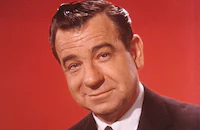Ensign Pulver

Brief Synopsis
Cast & Crew
Joshua Logan
Robert Walker Jr.
Burl Ives
Walter Matthau
Tommy Sands
Millie Perkins
Film Details
Technical Specs

Synopsis
Morale aboard a U. S. Navy cargo ship worsens when the hated Captain Morton refuses Bruno, a radio operator, permission to attend the funeral of his infant daughter. Later, Bruno tries to kill the captain, but Ensign Pulver wrests the gun from him, and the captain falls overboard during the fight. Pulver grudgingly dives in after him and maneuvers him into a life raft, but they are separated from the ship when a storm arises and presumed lost. Meanwhile, the ship's doctor institutes a new regime; he grants Bruno a shore leave, and morale picks up. On the life raft, the captain becomes ill, and as his condition worsens he becomes delerious. He reveals his past, which he believes causes his antisocial, brutish behavior, while Pulver takes notes. They land on a small island, and there Pulver, working under radioed instructions from the ship's doctor, performs an appendectomy on the captain. When they are returned to the ship, the captain becomes tyrannical again, but Pulver reveals that he knows enough about the captain's past to institute serious action against him, and he threatens to do so unless the captain has himself transferred to another ship. The captain agrees, and Pulver becomes a hero to the crew.

Director

Joshua Logan
Cast
Robert Walker Jr.

Burl Ives

Walter Matthau

Tommy Sands
Millie Perkins

Kay Medford

Larry Hagman
Gerald S. O'loughlin
Sal Papa
Al Freeman Jr.
James Farentino
James Coco
Don Dorrell
Peter L. Marshall
Robert Matek
Diana Sands
Joseph Marr

Jack Nicholson
Crew
Ralph Ayres
Gordon Bau
Ed Cronenweth
Joseph Curtis
Michael Daves
George Duning
Peter S. Feibleman
Dorothy Jeakins
John Jensen
Vic Johnston
Ben Kadish
William Kiernan
Leo K. Kuter
Charles Lawton
Joshua Logan
Joshua Logan
Monty Masters
Daniel J. Mccauley
Allen Mckenzie
Russell Menzer
M. A. Merrick
Robert J. Miller
Carl Morrison
Archie Neel
George Nogle
Harold Noyes
Bill Phillips
Jean Burt Reilly
William Reynolds
Bucky Rous
Leo Shreve
Marshall Wolins

Film Details
Technical Specs

Articles
Ensign Pulver
The action resumes back in the Pacific as WWII winds down, and the dispirited crew of the cargo ship USS Reluctant is still chafing under the dictatorial rule of the martinet Capt. Morton (Burl Ives). The ship's surgeon Doc (Walter Matthau) is still trying to pry some compassion from the skipper for the stressed sailors; and Ensign Frank Pulver (Robert Walker, Jr.) is still forever in pursuit of a fast buck. Tensions escalate even further when the captain callously refuses sympathy leave to crewman Bruno (Tommy Sands), who has lost his toddler daughter. The disgusted Pulver responds by escalating his campaign of pranks to undermine Morton's dignity.
Circumstances contrive to the point where the skipper is washed overboard during a storm, and Pulver is the only one in a position to rescue him. The enterprising ensign finds himself stuck adrift in a life raft having to ensure the survival of the despised captain, and possibly learn the reasons for his miserable demeanor.
In his 1978 autobiography Movie Stars, Real People, and Me, Logan made no bones about the indifferent public response to Ensign Pulver. "We though we had everyone in the picture that anyone could ask for," he reminisced. "But we had left out the most important thing: the catalytic agent, Mister Roberts. And without him, the story falls into shreds. No one really cares about the others enough to create suspense as to the outcome."
Besides Jack Nicholson (who, recalled Logan, "appointed himself my 'assistant producer': he helped me cast some of the other actors as well as Millie Perkins"), the sharp-eyed viewer will be able to pick out Larry Hagman, Peter Marshall, James Coco, James Farentino, Dick Gautier, George Lindsey and Gerald S. O'Loughlin from the officers and seamen.
Producer: Joshua Logan
Director: Joshua Logan
Screenplay: Peter S. Feibleman; Joshua Logan (screenplay and play "Mister Roberts"); Thomas Heggen (novel "Mister Roberts", play "Mister Roberts")
Cinematography: Charles Lawton, Jr.
Art Direction: Leo K. Kuter
Music: George Duning
Film Editing: William Reynolds
Cast: Robert Walker (Ensign Frank Pulver), Burl Ives (Captain Morton), Walter Matthau (Doc), Tommy Sands (John X. Bruno), Millie Perkins (Nurse Scotty), Kay Medford (Head Nurse), Larry Hagman (Lt. J.G. Billings), Peter L. Marshall (Lt. J.G. Carney), Joseph Marr (C.P.O. Dowdy), Gerald O'Loughlin (Lt. S.G. LaSueur), Diana Sands (Mila), Robert Matek (Captain Donald 'Stretch' Zimmer), Jack Nicholson (Dolan), Al Freeman, Jr. (Taru).
C-105m. Letterboxed.
by Jay S. Steinberg

Ensign Pulver
Quotes
Trivia
Notes
Location scenes filmed in Mexico City and Acapulco. Working title: Mr. Pulver and the Captain. Sequel to Mister Roberts (Warner Bros., 1955).

Miscellaneous Notes
Released in United States Summer July 1964
Sequel to "Mister Roberts".
Released in United States Summer July 1964















